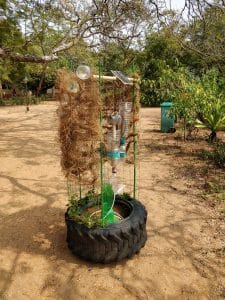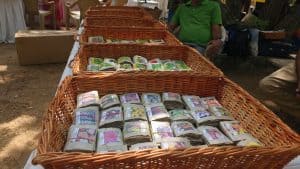The thrust on sustainability at a citizen’s level has been evident over the last few years with a steady leaning towards greener lifestyle choices among many Chennaiites. The profusion of news highlighting the threats and signs of climate change has caught the attention of the aware and sensitive, making them realise that the adoption of earth-friendly products and practices is no longer merely an option, but an imperative.
But for many others, a major stumbling block still remains: “But what can I do as an individual?” Thankfully, there are a large number of people and organisations who are trying to break that mental barrier, to promote sustainability at the grassroots level by creating awareness about an environment-friendly way of living and also providing the tools and guidance to actually attain that. For them, sustainability does not end with just making greener choices, the circle is complete only when you can impact and inspire the lives of people around you.
At the Reciprocity Fest on February 10th and 11th, at the Kalakshetra Foundation, a large number of such start-ups came together to sell their products and create awareness about reciprocating to the environment. From companies that offer eco-friendly interior designs to ones that sell pencils made of paper, they were all there around the giant banyan tree in Kalakshetra.
Citizen Matters spoke to a few of them to explore how they are influencing and helping others adopt sustainability.
What does sustainability mean?
A sustainable lifestyle can be defined in countless ways. Even the choice of materials used for home decor can signify a certain level of sustainability. Talking from the perspective of architecture and design, Mahima Sashank of Stone Lotus, an architect-led and design-build studio, explains, “To me, sustainability is the judicious use of resources, causing minimal harm to nature and creating maximum satisfaction.”
Many people visiting their stall were curious to know more about their projects and the materials that they used for design. “The participants have come here to know how they can lead a sustainable life without harming the environment and we are able to aid them in figuring out some answers,” said Mahima.
Another group that looks at sustainability through an entirely different lens, and simultaneously promotes a different cause is the Aarde Foundation. “We sell palm leaf products for two different reasons — one, it provides a livelihood for women living in Pazhaverkadu and secondly and most importantly, we want to use a part of the funds generated to save the Pulicat Lake which is essential for the city to sustain itself. We are trying to attract the government’s attention to the alarming state of the lagoon, and use the funds that we gain from these products to create more awareness. We are not limiting our focus to the climate but also considering the entire eco-system of the lagoon, which attracts innumerable rare species of birds,” said Peter R, sales executive at Aarde Foundation.
An opportunity for youngsters

Urban Rootz — products direct from the land of farmers for creating a sustainable environment. Pic: Urban Rootz
Founded by a group of three youngsters, Urban Rootz is a store that sells organic products such as Thinai and Samba rice, snack items made of organic raw produce and making organic giveaway gifts.
“Since we have just started, having even ten customers is an achievement to us. Moving forward, we plan to initiate an organic movement where we are planning to convince all farmers to adopt organic measures to grow their products,” said G Karthik, one of the founders of Urban Rootz.
The Reciprocity Fest not only provided a space to sell sustainable products, but also served as an arena for students to explore and develop different green prototypes and models. A few students of architecture, for example, exhibited a prototype that generates water from the moisture to make a tree self-sustainable.

Atmospheric water generator prototype developed by the architecture students of MARG Institute of Architecture and Design. Pic: Govardhan S
“We just gave it a shot and we saw many people walking over to us to find out what the project is all about. There are people who refrain from growing plants at home, because they cannot meet the water needs. To tackle it, we developed this prototype, where the plant is self-sustainable, and can thrive merely by deriving moisture from the atmosphere in the presence of vetiver grass. The response has been tremendously motivating and a few people also promised us help in developing the prototype and taking it to the market,” said Dhanush P, an architecture student at MARG Institute of Design and Architecture.
Other initiatives across the city
There are several people who practise organic terrace gardening in various parts of the city.
We get fresh and nice fruits and veggies from supermarkets with farm fresh tags, but we rarely know the amount of chemicals that may have gone into growing them. Chennai is also a growing hub for healthcare, in part due to the innumerable maladies afflicting people here. Experts say that growing one’s own food can address health issues and lifestyle diseases to a large extent.
“We want everyone to grow safe food in their homes,” commented Badri Narayanan of Organic Garten. But Narayanan was not happy. “I must admit that the kind of response I received is below par, leading me to infer that people still prefer cheap, unsustainable products. We are trying to give gyan on organic gardening, but interested people are rare. We are not giving up, but we will take sustainable living close to every common man,” he said.
A definite factor behind the resistance to the shift towards ‘organic’ or ‘sustainable’ is the cost factor. Driven by the formula of cost-effectiveness, most people are unwilling to dole out the extra money for eco-friendly products. Karunakaran N, founder of Grafiray — makers of eco-friendly stationery — says in this regard, “Unless people change their attitude of always prioritising cost-effectiveness, they will continue to abuse the environment. Like water and food, notebooks, pencils and plastic products have become inevitable in many lives. We manufacture recycled notebooks, upcycled pencils, paper bags and other such products. Contrasted with other eco products, we also try to sell our products at reasonable rates,but even then people request for a discount.”
Sustainability is a choice, but a choice whose adoption can make all the difference to the planet. If you are grappling with how to go green, fortunately for you, there are many in the city — like all those mentioned above — who can help you take the plunge.
